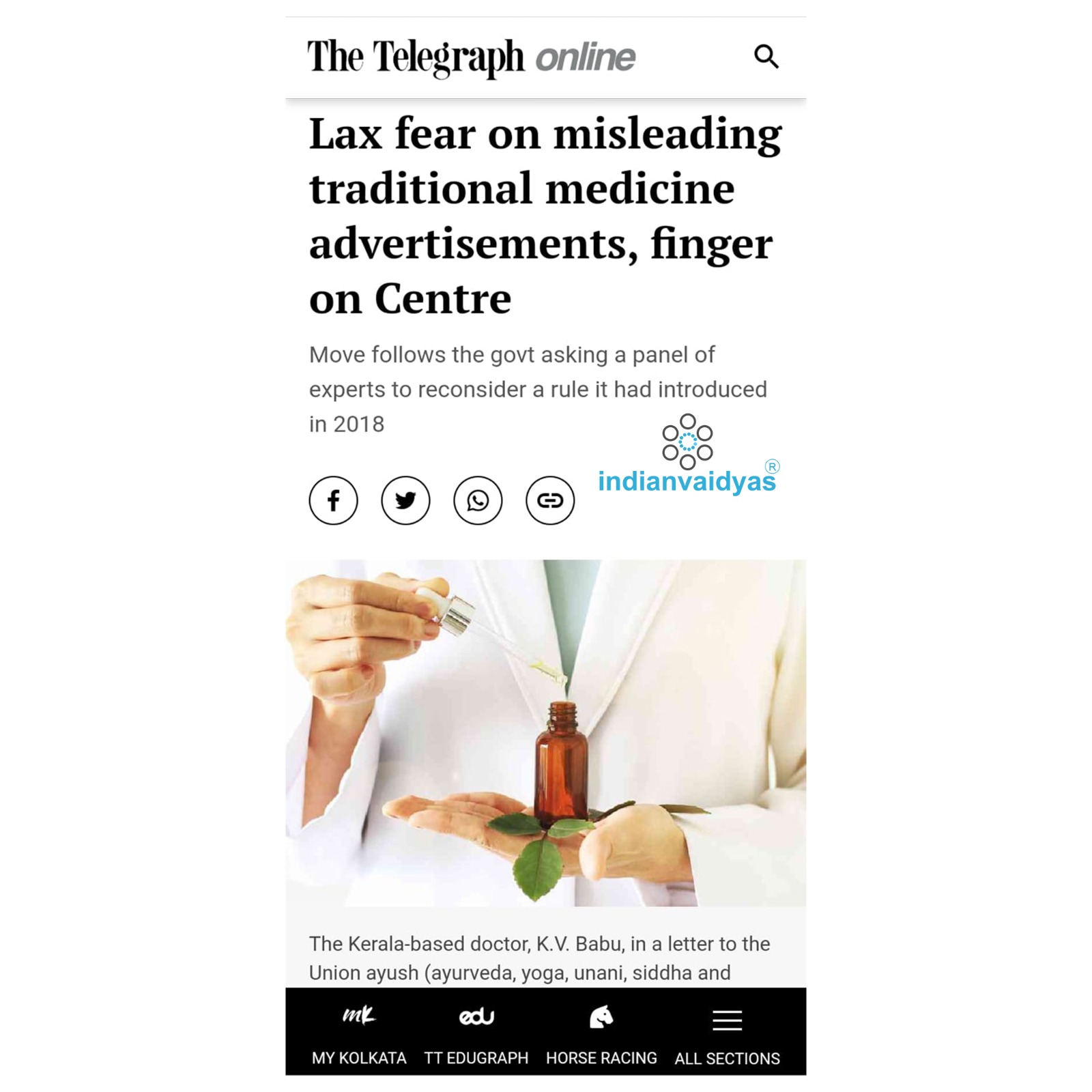Lax fear on misleading traditional medicine advertisements, finger on Centre
29-May-23 12:38:51

Move follows the govt asking a panel of experts to reconsider a rule it had introduced in 2018
A doctor has accused the Centre of attempting to renege on its commitment to curb misleading and inappropriate advertisements of traditional medicine products by asking a panel of experts to reconsider a rule it had introduced in 2018.
The Kerala-based doctor, K.V. Babu, in a letter to the Union ayush (ayurveda, yoga, unani, siddha and homeopathy) ministry on Friday, questioned the Centre’s decision to ask the Ayurveda, Siddha, Unani Drugs Technical Advisory Board (ASUDTAB) to reconsider the rule.
Rule 170 in the Drugs and Cosmetics Rules 1945 was introduced by the ayush ministry through a gazette notification on December 24, 2018, to curb inappropriate advertisements of ayurveda, unani and siddha products.
Babu’s letter has referred to a Delhi High Court order that noted that a lawyer representing the Centre had told the court during the hearing of writ petitions from several drug makers that Rule 170 would be placed before the ASUDTAB “for reconsideration”.
“When the media are flooded with misleading ads, the submission of the Government of India to request ASUDTAB to reconsider Rule 170, instead of enforcing it, is a very unfortunate decision,” Babu wrote in the letter sent to ayush minister Sarbananda Sonowal.
Babu has cited the ayush ministry’s statement on June 29, 2019, to Parliament in which it had said Rule 170 had been inserted “specifically” to control inappropriate advertisements of ayurveda, siddha and unani medicines.
“More than four years after introducing Rule 170 to curb such misleading ads, the government wants it reconsidered,” Babu told The Telegraph. “What does reconsider mean — this suggests that the Centre is no longer keen on curbing such ads.”
Minister Sonowal had himself told Parliament on March 22, 2022, that pharmacovigilance centres for ayush drugs set up in different parts of the country had reported 18,812 “objectionable advertisements” from 2018 to December 2021. The department of consumer affairs had registered 1,416 misleading advertisements of ayush products and services from April 2014 to July 2021, while the Advertising Standards Council of India — a voluntary industry body — had from 2017-19 reported 1,229 misleading advertisements of ayush products.
A doctor has accused the Centre of attempting to renege on its commitment to curb misleading and inappropriate advertisements of traditional medicine products by asking a panel of experts to reconsider a rule it had introduced in 2018.
The Kerala-based doctor, K.V. Babu, in a letter to the Union ayush (ayurveda, yoga, unani, siddha and homeopathy) ministry on Friday, questioned the Centre’s decision to ask the Ayurveda, Siddha, Unani Drugs Technical Advisory Board (ASUDTAB) to reconsider the rule.
ADVERTISEMENT
Rule 170 in the Drugs and Cosmetics Rules 1945 was introduced by the ayush ministry through a gazette notification on December 24, 2018, to curb inappropriate advertisements of ayurveda, unani and siddha products.
Babu’s letter has referred to a Delhi High Court order that noted that a lawyer representing the Centre had told the court during the hearing of writ petitions from several drug makers that Rule 170 would be placed before the ASUDTAB “for reconsideration”.
“When the media are flooded with misleading ads, the submission of the Government of India to request ASUDTAB to reconsider Rule 170, instead of enforcing it, is a very unfortunate decision,” Babu wrote in the letter sent to ayush minister Sarbananda Sonowal.
Babu has cited the ayush ministry’s statement on June 29, 2019, to Parliament in which it had said Rule 170 had been inserted “specifically” to control inappropriate advertisements of ayurveda, siddha and unani medicines.
ADVERTISEMENT
Ads by
“More than four years after introducing Rule 170 to curb such misleading ads, the government wants it reconsidered,” Babu told The Telegraph. “What does reconsider mean — this suggests that the Centre is no longer keen on curbing such ads.”
Minister Sonowal had himself told Parliament on March 22, 2022, that pharmacovigilance centres for ayush drugs set up in different parts of the country had reported 18,812 “objectionable advertisements” from 2018 to December 2021. The department of consumer affairs had registered 1,416 misleading advertisements of ayush products and services from April 2014 to July 2021, while the Advertising Standards Council of India — a voluntary industry body — had from 2017-19 reported 1,229 misleading advertisements of ayush products.
Ayush officials and Babu himself have argued in the past that two existing laws — the Drugs and Cosmetics Act 1954 and the Drugs and Magic Remedies Act 1945 — allow health authorities to identify misleading advertisements and prosecute offenders.
A query sent by this newspaper to the ayush ministry on Friday evening, requesting its response to Babu’s concerns, has evoked no response.
SOURCE & CREDIT: THE TELEGRAPH ONLINE